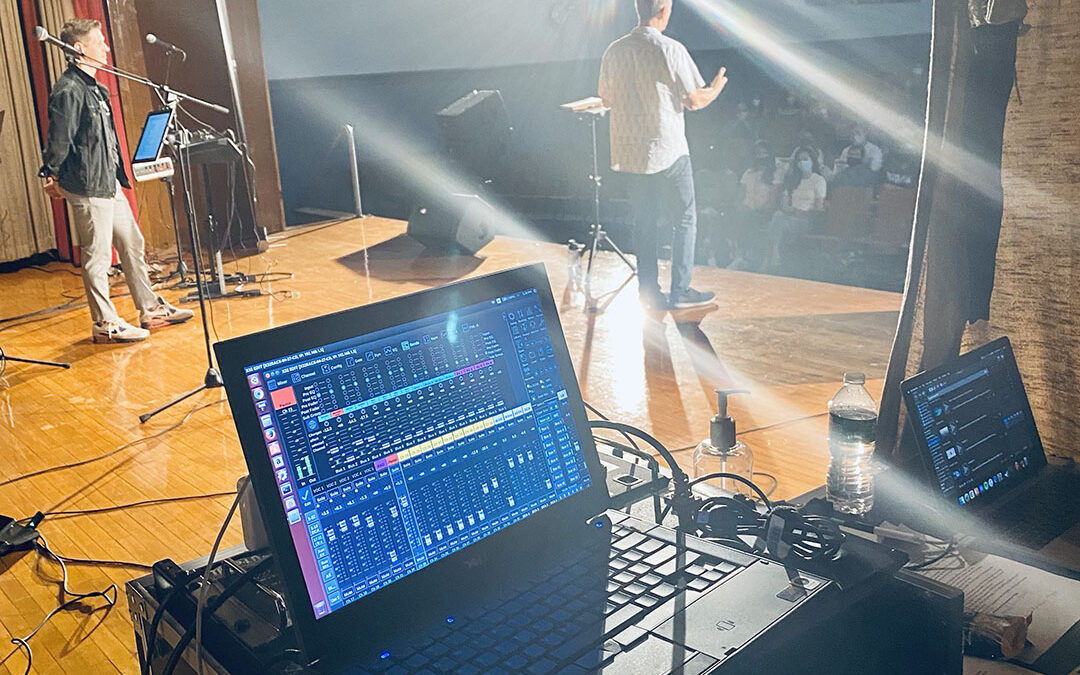This means that I get to think about what’s happening on the stage at our venue, and help coordinate everything from audio and lights to visual presentations. After watching and participating in church services through YouTube for roughly a year and a half, being back together feels great!
In recent weeks, we’ve been getting back into the rhythm of Sunday worship services at our venue, a public school in midtown Manhattan. And very soon, I’ll have a meeting with some volunteers who are interested in serving on the Stage Team! I’ve been thinking a lot about how the meeting will go so that’s the topic I’ll write about today to help me process my thoughts a little more…
I was thinking of starting the interest meeting with a quick discussion about service – what is it and why is it important? We are called to be servants of God and it’s a term we hear a lot, but what does that even mean?
A common definition of a servant is someone who waits on their master/boss to tell them what do, then they go off and do the job by themselves. This cycle then repeats indefinitely throughout ones time of servitude. Servants work for their masters. Is that how we should see ourselves?
The most insightful perspective I’ve read on the topic comes from a book called, “Experiencing God: Knowing and Doing the Will of God” by Henry & Richard Blackaby and Claude King. Right at the start in Unit 1, there’s a section in the workbook called “Learning to Be a Servant of God” (page 17). The author says, “My understanding of a servant is depicted by the potter and the clay”…

In Jeremiah 18:1-6, we read about the potter and the clay –
“The word that came to Jeremiah from the Lord: 2 “Arise, and go down to the potter’s house, and there I will let you hear my words.” 3 So I went down to the potter’s house, and there he was working at his wheel. 4 And the vessel he was making of clay was spoiled in the potter’s hand, and he reworked it into another vessel, as it seemed good to the potter to do.
5 Then the word of the Lord came to me: 6 “O house of Israel, can I not do with you as this potter has done? declares the Lord. Behold, like the clay in the potter’s hand, so are you in my hand, O house of Israel.“
The clay (that’s us!) has only two things that it needs to do – and both of them are in response to the potter (this is God). The author put it this way:
- The clay has to be molded. It has to be responsive to the potter so he can make it into an instrument of his choosing.
- The clay has to remain in the potter’s hands. When the potter has finished making the instrument of his choosing, that instrument has no ability to do what it wants. It has to remain in the potter’s hands to be effective.
God’s servants don’t work for God, God works through his servants.
My definition of what it meant to be God’s servant (especially in the context of serving at church) didn’t line up with God’s. My approach wasn’t life-giving because it was centered around me and what I can bring to the table or get from the exchange. It was a whole lot of, “me, me, me” – how can this help me meet new people, how can this help prepare me for new work opportunities, how can this make me feel good about myself, God must be happy with me because I’m putting so much time into all this serving…. Ummm, no! Honestly, before being challenged by this new framework of servanthood, being a servant of God felt frustrating and unsustainable to me – like how are we supposed to do this (and do it joyfully) every day for the rest of our lives?
The memory verse for the unit ties it together –
“I am the vine; you are the branches. If a man remains in me and I in him, he will bear much fruit; apart from me you can do nothing.” – John 15:5
God is the one who shapes us into an instrument of his choosing, and then he accomplishes his works and his will through our lives.
He’s not a celestial taskmaster endlessly barking out orders for us to work, work, work… He’s calling us to relationship where as we walk closely with him, and from this place of relationship He transforms us and uses our lives to impact others. We don’t have the ability to do it ourselves. It’s God who works through us.
So as God’s servant, I just need to remain moldable and stay in God’s hands.
Outside of that place, I can’t do anything. In that place, the possibilities are limitless because whatever God can do, then I can do. It’s God who is accomplishing all of the work, doing what He wants to do THROUGH my life and obedience.
So what does all of this have to do with church and specifically church production?
Well…in planning for the in-person worship experience after going for nearly 18 months with no in-person gatherings, I can already see that my view of what a church service should look like and feel like has changed.
It’s easy to generate a nice, long to-do list of all the work that needs to be done with setup/tear down each week. And I know these lists will definitely have their place (I LOVE lists!) But I’ve also been thinking of ways to create a space where the volunteers are growing (being molded) as they serve, and developing a team mindset that is life-giving and continually pointing us back to the potter – not our own skills and abilities or what we can do for the church.
I’m also thinking about what God wants to do in New York City. I don’t think the foundational answer to that changes much whether we are in a pandemic or not – He wants people to come to know him, the lost to be found, for us to experience him, walk with him daily, and put our faith in him. Jesus came to seek and save the lost, to bind the wounds of the broken, to redeem…
So why then do we have to go through the whole routine of setting up the lights and sound equipment and going through all of the trouble from week to week to produce a church service? What does all of that work have to do with all of this?
I personally believe (and this is what helps me serve when I don’t feel like it – hahaha!) that what we are doing is preparing a place in the city for people to meet with God, learn more about him, worship him, sing to him, pray to him, and to get to know one another too! We are building a tabernacle and place of worship, a place that invites in and welcomes the presence of God. And we are doing it in community.
All of the miscellaneous production things aren’t necessary for God’s presence to be felt among us, but they do help in providing a more distraction-free worship experience for the community.
Have you ever wanted to sing along to a song that everyone was jamming to, but didn’t know the words?
Have you ever had to sit in the back of an auditorium or large space and you couldn’t hear the speaker well? (This happened to me a few classes in college)
Have you ever listened to music that seemed to be out of time and out of tune?
Yep, I have too. These are just a few of the scenarios we’re trying to avoid and why we take time to think about church production and preparation.
So we set up the giant speakers and sound system, and the worship team rehearses and develops their musical skills, and we create visually-pleasing media presentations with the lyrics and sermon notes because it helps us offer our best and it helps others who are new to feel like they can be part of what God is doing too in a practical – right here, right now way.
While we are setting up lights, and connecting microphones, and assembling the projector screen – we are here because God is up to something, he wants to meet with us. We are helping create an environment where more people can join in and be invited into the worship experience, and ultimately start their own journey of knowing God personally.
My heart is that the Service Teams volunteers (Stage Team + People Team + Kids Team) will see their service in the church as an act of worship and obedience. God is working through us to reach this beautiful city we call home.

